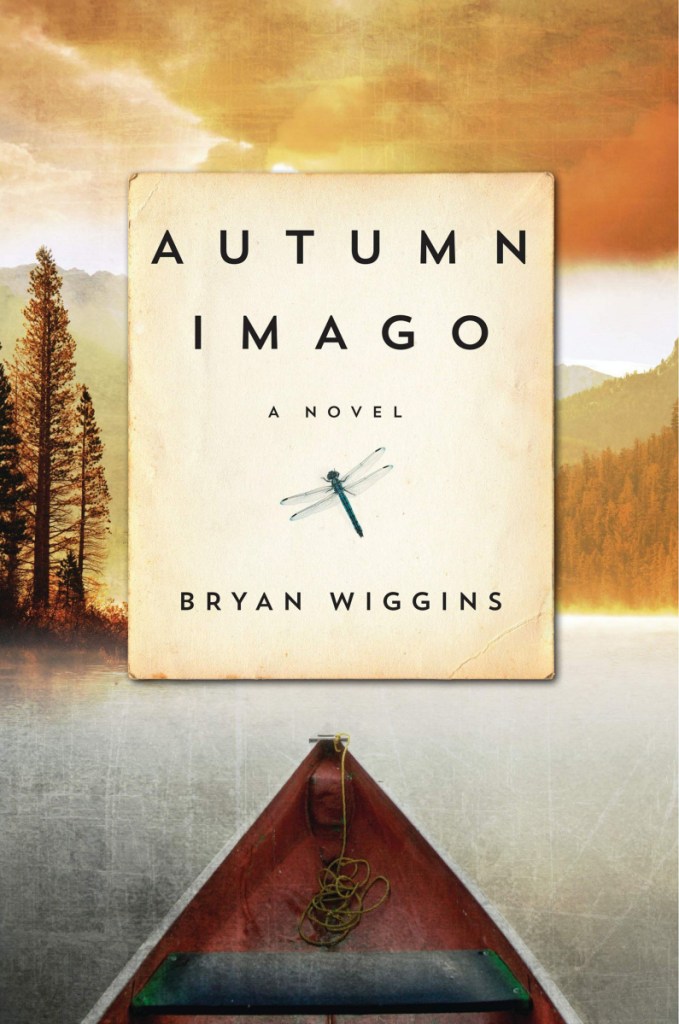Baxter State Park is awe-inspiring. It’s a place of magnificent natural beauty where peacefulness and tranquility offer relief from the stress of day-to-day life, and provide visitors a chance to look inward.
In his novel “Autumn Imago,” Maine-based author Bryan Wiggins observes that it is nothing short of a miracle that such beauty and solitude can exist in a world of 7 billion people. Although “Autumn Imago” was published in 2016, the larger themes in Wiggins’ story – of loss, recovery and hope, set in Baxter State Park – are perhaps even more relevant today.
The “Autumn” part of the title is self-evident: That’s when the story takes place. The “Imago” part is less obvious, and Wiggins helpfully includes a definition at the beginning of the book. For readers like me who needed a reminder, “imago” can mean two things: a final stage in insect maturation, or an idealized image of a parent that unconsciously guides behavior. “Autumn Imago” is an apt title for this book because nature and family relationships are at its heart.
After drifting around the country for many years, Paul Strand returns to Baxter State Park, where he works as a park ranger, enjoying its natural beauty and the satisfaction of finally finding a place to call home. Paul’s solitude is disrupted by an urgent call from his sister Kim, who reports that their mother’s dementia has worsened to the point where full-time care in an assisted-living facility may be needed.
Paul leaves the park and travels to Massachusetts to meet with Kim and their mother, Mara, who refuses to consider moving to an assisted-living facility until the entire family has a reunion at Kidney Pond in Baxter State Park. The family used to vacation there years ago. Paul is tasked with bringing the family back together at the pond in the shadow of Katahdin.

Bryan Wiggins
The request is much more difficult than it seems. When the family was last at Kidney Pond, Paul’s younger sister Jordan drowned, devastating the family and changing the course of each of their lives.
There are interpersonal challenges to the proposed reunion as well. Paul has to connect with Kim’s two otherwise-preoccupied teenage children, Aida and Aaron, whom he hasn’t seen in years and who have absolutely no interest in going to the Maine woods.
Then there is Kim’s husband, Robert, a domineering, insensitive man Paul dislikes almost immediately and who – in an illustration of the psychological themes in the novel – reminds Paul of his father. Paul also has to track down his brother Tommy, who is addicted to drugs and has gone missing, apparently leaving his pregnant girlfriend behind. In the midst of all this, Paul is navigating a relationship with Cassie, a fellow park ranger. Although they have a connection, Paul is unable to commit to their relationship and finds himself fleeing from intimacy.
This fragile, flawed family eventually meets at Kidney Pond for 10 days, where they try mightily to heal in the face of the life-altering trauma of Jordan’s death and Mara’s declining health. At the same time, they can’t seem to stop themselves from incessantly acting out their foibles.
Paul’s teenage niece and nephew, one-generation removed from Jordan’s death, provide important perspectives throughout the book. In one example that illustrates the novel’s lofty ambitions, Aaron speculates that Jordan may be alive in another dimension by making reference to a famous physics experiment by Erwin Schrödinger. Meanwhile, Aida provides shattering insights into her parents’ relationship, and while playing a piece by Massenet on her violin, she accomplishes a unique, opera-duo feat: Aida playing Thaïs.
In addition to being a novelist, Wiggins regularly visits the mountains of Maine and is a writer for Canoe & Kayak and Sea Kayak magazines. This real-world experience is on display as he writes about hiking in the Maine woods and canoeing on Maine ponds. Based on this perspective, he observes, “Visitors to Baxter come looking for what this world has lost. They search for the things that live outside the boxes that rule the civilized world.”
Wiggins’ sharp details of life and death on Maine waters, with navigation-altering winds and dangerous waves, reverberate throughout the book, including in the first chapter, where a tragic death is ominously foreshadowed and vividly described. Wiggins made a bold choice by realistically describing these events in the first chapter rather than presenting them as a fait accompli. His approach is decidedly not my cup of tea, and was not relevant to any of the characters because they did not witness the tragedy. Still, the opening chapter presents a powerful, if difficult, framework for the narrative.
Ultimately, though, this is a book about hope. It’s about facing challenges and persevering in the face of soul-crushing difficulty. Midway through the book, Wiggins reflects on hope by comparing it to a Maine winter: “Like every Mainer, I endured it by thinking of the brighter days ahead, knowing that when they arrived, I would savor them …”
Wiggins is at work on the second book in what will be an “Imago” trilogy.
Dave Canarie is an attorney and adjunct faculty member at University of Southern Maine.
Send questions/comments to the editors.



Comments are no longer available on this story